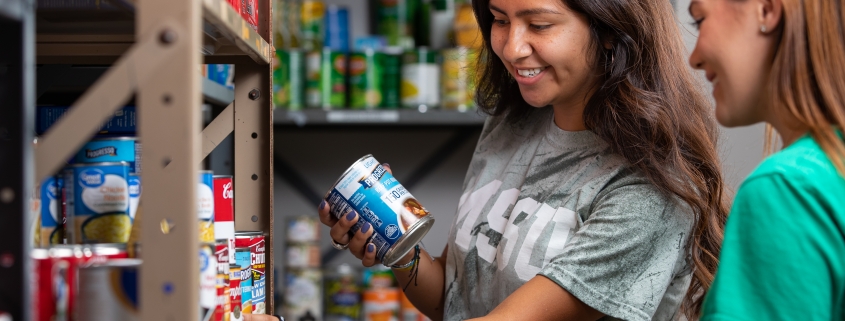Going hungry is detrimental to anyone’s well-being, but this is especially true for students as food insecurity can create a ripple effect that impacts their education, and therefore, their future.
Food insecurity is the inability to buy healthy, nutritious meals or the inability to buy food altogether. In Joplin Schools, an estimated 400 elementary students and 400 middle and high school students are considered food insecure.
“They can’t be certain they’ll have access to adequate nutrition outside of a school building,” says Sarah Coyne, coordinator of Bright Futures Joplin. “While more than 60% of Joplin students qualify for free and reduced lunches, these students are living in more than just economic deprivation. Their hunger impacts every area of their lives.”
Studies from Feeding America, the Food Research & Action Center, and Hunger in the Ozarks have shown that food-insecure students are more likely to:
- Have trouble concentrating in school
- Frequently miss class, repeat a grade, or drop out of school
- Exhibit behavioral issues
- Suffer from impaired development and motor skills
- Lag behind their peers in reading and math
- Face illness or chronic health conditions
“We know that hungry students focus less on learning and more on their empty bellies,” explains Coyne.
This knowledge fuels a major part of Bright Futures’ mission. In 2010, the nonprofit began leveraging community resources to aid students in need. Today, they have over 70 affiliates nationwide who provide students with basic essentials, including school supplies, hygiene products, beds, clothing, and especially meals.
This need for food created the Bright Futures Joplin Snack Pack program, which distributes take-home bags each Friday. The program ensures that students have enough to eat over weekends and holiday breaks.
“Many local families struggle through seasons of economic insecurity,” says Coyne. “Knowing how prevalent these troubles are, it’s vital that we invest in our younger generations so they can grow into the future leaders, workers, and parents of Joplin.”
This necessary investment, and the impacts of hunger, are not limited to younger students. The College & University Food Bank Alliance estimates that one in five college students face some form of food insecurity, but this issue is often overlooked or forgotten.
“The focus is often on food insecurity in K-12 students,” says Dr. Andrea Cullers, Director of the Lion Co-Op at Missouri Southern State University (MSSU).
Cullers knows that the concerns for a food-insecure K-12 student’s well-being are essentially the same for a food-insecure college student.
“The same issues of focus, chronic stress, and decreased ability to learn also occur in college students who are food insecure,” she explains.
Around 23% of MSSU students have been food insecure at some point within the last year. These students cannot function properly without adequate nutrition, and Cullers says their academics suffer. This is where the Lion Co-Op aims to help.
Since 2018, the Lion Co-Op has served as the on-campus food pantry for students, employees, and Lion Cub Academy families. They offer pre-packaged dry goods, microwavable meals, and fresh groceries like milk, eggs, and yogurt. There is even a selection of toiletries and hygiene products.
Before COVID-19, Cullers says that they saw around 50 students each week. In 2020, when they had to switch to an online ordering system, that number dropped by half. At the start of this school year, they returned to their previous in-store model and are seeing more and more students.
“This semester, we are excited to reopen as a ‘grocery store,’ and our numbers are already rebounding,” she explains. “[We are] seeing around 30 students a week.”
As they continue to grow, the Co-Op is looking forward to expanding their outreach. Cullers says they’ve already added food scholarships to local farmers markets, SNAP benefits assistance, and a snack bag program for Lion Cub Academy. They hope to do even more in the future.
Similarly, Bright Futures is excited to see what this school year brings as they continue to support students in the community.
“We are continually impressed by and proud of Joplin’s generosity and care for students in need of a helping hand,” concludes Coyne.
Want to be that helping hand? Learn more about how you can help Bright Futures Joplin here and how you can assist the Lion Co-Op here.


